Support Work in Social Care: Roles of Non-Direct Care Workers Report
VerifiedAdded on 2020/06/05
|6
|1516
|462
Report
AI Summary
This report provides a comprehensive overview of the roles and responsibilities of non-direct care workers within a social care setting. It begins by defining non-direct care workers, including office staff and maintenance personnel, and then explores the importance of interpersonal skills, such as verbal and non-verbal communication. The report details the role of these workers in team operations, emphasizing safe working practices and collaboration with managers. It also examines their contributions to maintaining health and safety, including hygiene protocols and waste disposal. Furthermore, the report discusses the effectiveness of supervision and management in the development process, highlighting the importance of guidance, emotional support, and respectful interactions. The conclusion summarizes the significance of non-direct care workers in the overall functioning of a social care organization and the impact of their skills and responsibilities on the quality of care provided. The report draws upon various sources to support its findings.
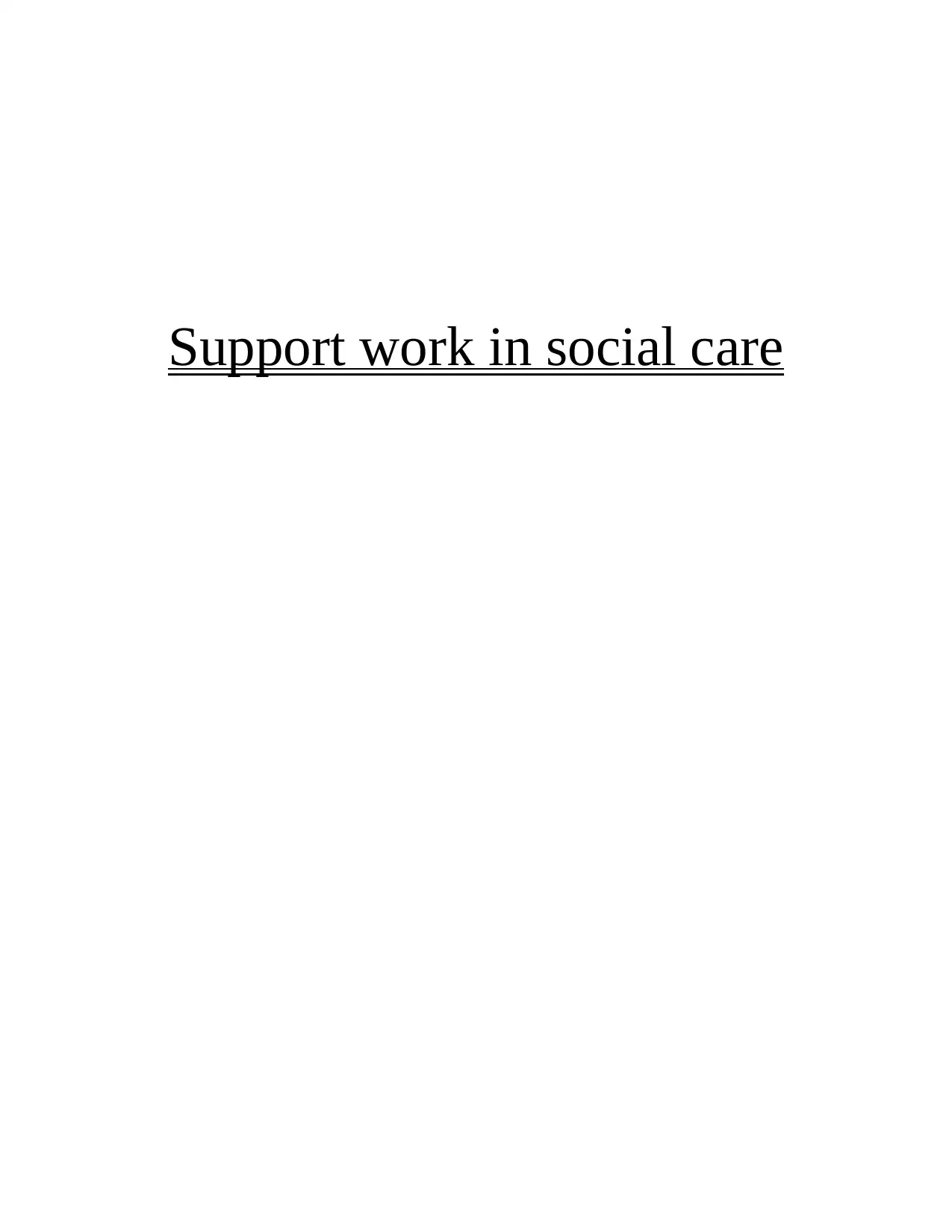
Support work in social care
Paraphrase This Document
Need a fresh take? Get an instant paraphrase of this document with our AI Paraphraser

TABLE OF CONTENTS
Introduction....................................................................................................................................................3
P1 Role of non direct Care workers...........................................................................................................3
P2 Interpersonal skills for non direct care workers...................................................................................3
P3 Role of non direct care workers in operation of a team.......................................................................4
P4 Role of workers in maintaining health and safety................................................................................4
P5 Effectiveness of supervision and management in the development process........................................4
CONCLUSION..............................................................................................................................................4
REFERENCES..............................................................................................................................................5
Introduction....................................................................................................................................................3
P1 Role of non direct Care workers...........................................................................................................3
P2 Interpersonal skills for non direct care workers...................................................................................3
P3 Role of non direct care workers in operation of a team.......................................................................4
P4 Role of workers in maintaining health and safety................................................................................4
P5 Effectiveness of supervision and management in the development process........................................4
CONCLUSION..............................................................................................................................................4
REFERENCES..............................................................................................................................................5
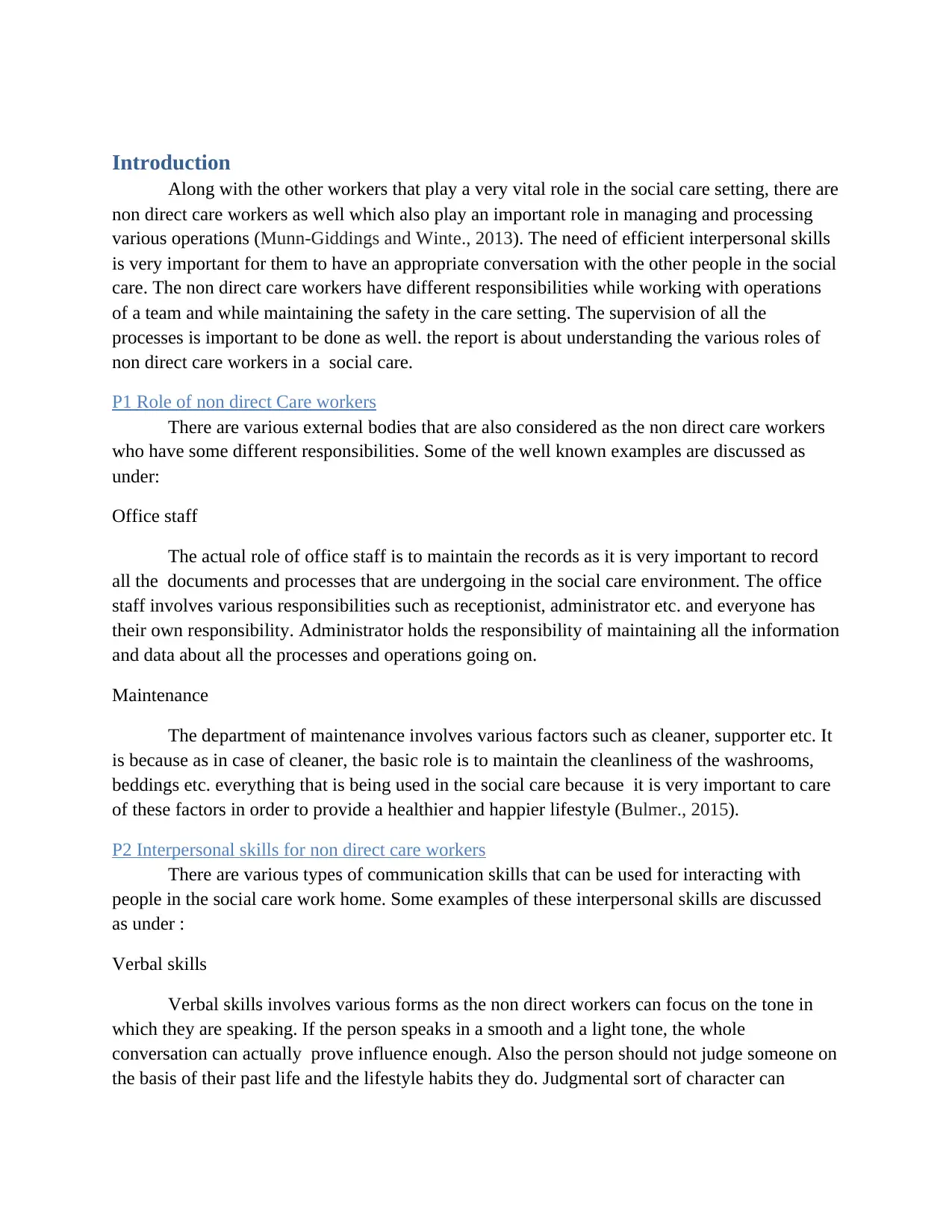
Introduction
Along with the other workers that play a very vital role in the social care setting, there are
non direct care workers as well which also play an important role in managing and processing
various operations (Munn-Giddings and Winte., 2013). The need of efficient interpersonal skills
is very important for them to have an appropriate conversation with the other people in the social
care. The non direct care workers have different responsibilities while working with operations
of a team and while maintaining the safety in the care setting. The supervision of all the
processes is important to be done as well. the report is about understanding the various roles of
non direct care workers in a social care.
P1 Role of non direct Care workers
There are various external bodies that are also considered as the non direct care workers
who have some different responsibilities. Some of the well known examples are discussed as
under:
Office staff
The actual role of office staff is to maintain the records as it is very important to record
all the documents and processes that are undergoing in the social care environment. The office
staff involves various responsibilities such as receptionist, administrator etc. and everyone has
their own responsibility. Administrator holds the responsibility of maintaining all the information
and data about all the processes and operations going on.
Maintenance
The department of maintenance involves various factors such as cleaner, supporter etc. It
is because as in case of cleaner, the basic role is to maintain the cleanliness of the washrooms,
beddings etc. everything that is being used in the social care because it is very important to care
of these factors in order to provide a healthier and happier lifestyle (Bulmer., 2015).
P2 Interpersonal skills for non direct care workers
There are various types of communication skills that can be used for interacting with
people in the social care work home. Some examples of these interpersonal skills are discussed
as under :
Verbal skills
Verbal skills involves various forms as the non direct workers can focus on the tone in
which they are speaking. If the person speaks in a smooth and a light tone, the whole
conversation can actually prove influence enough. Also the person should not judge someone on
the basis of their past life and the lifestyle habits they do. Judgmental sort of character can
Along with the other workers that play a very vital role in the social care setting, there are
non direct care workers as well which also play an important role in managing and processing
various operations (Munn-Giddings and Winte., 2013). The need of efficient interpersonal skills
is very important for them to have an appropriate conversation with the other people in the social
care. The non direct care workers have different responsibilities while working with operations
of a team and while maintaining the safety in the care setting. The supervision of all the
processes is important to be done as well. the report is about understanding the various roles of
non direct care workers in a social care.
P1 Role of non direct Care workers
There are various external bodies that are also considered as the non direct care workers
who have some different responsibilities. Some of the well known examples are discussed as
under:
Office staff
The actual role of office staff is to maintain the records as it is very important to record
all the documents and processes that are undergoing in the social care environment. The office
staff involves various responsibilities such as receptionist, administrator etc. and everyone has
their own responsibility. Administrator holds the responsibility of maintaining all the information
and data about all the processes and operations going on.
Maintenance
The department of maintenance involves various factors such as cleaner, supporter etc. It
is because as in case of cleaner, the basic role is to maintain the cleanliness of the washrooms,
beddings etc. everything that is being used in the social care because it is very important to care
of these factors in order to provide a healthier and happier lifestyle (Bulmer., 2015).
P2 Interpersonal skills for non direct care workers
There are various types of communication skills that can be used for interacting with
people in the social care work home. Some examples of these interpersonal skills are discussed
as under :
Verbal skills
Verbal skills involves various forms as the non direct workers can focus on the tone in
which they are speaking. If the person speaks in a smooth and a light tone, the whole
conversation can actually prove influence enough. Also the person should not judge someone on
the basis of their past life and the lifestyle habits they do. Judgmental sort of character can
⊘ This is a preview!⊘
Do you want full access?
Subscribe today to unlock all pages.

Trusted by 1+ million students worldwide
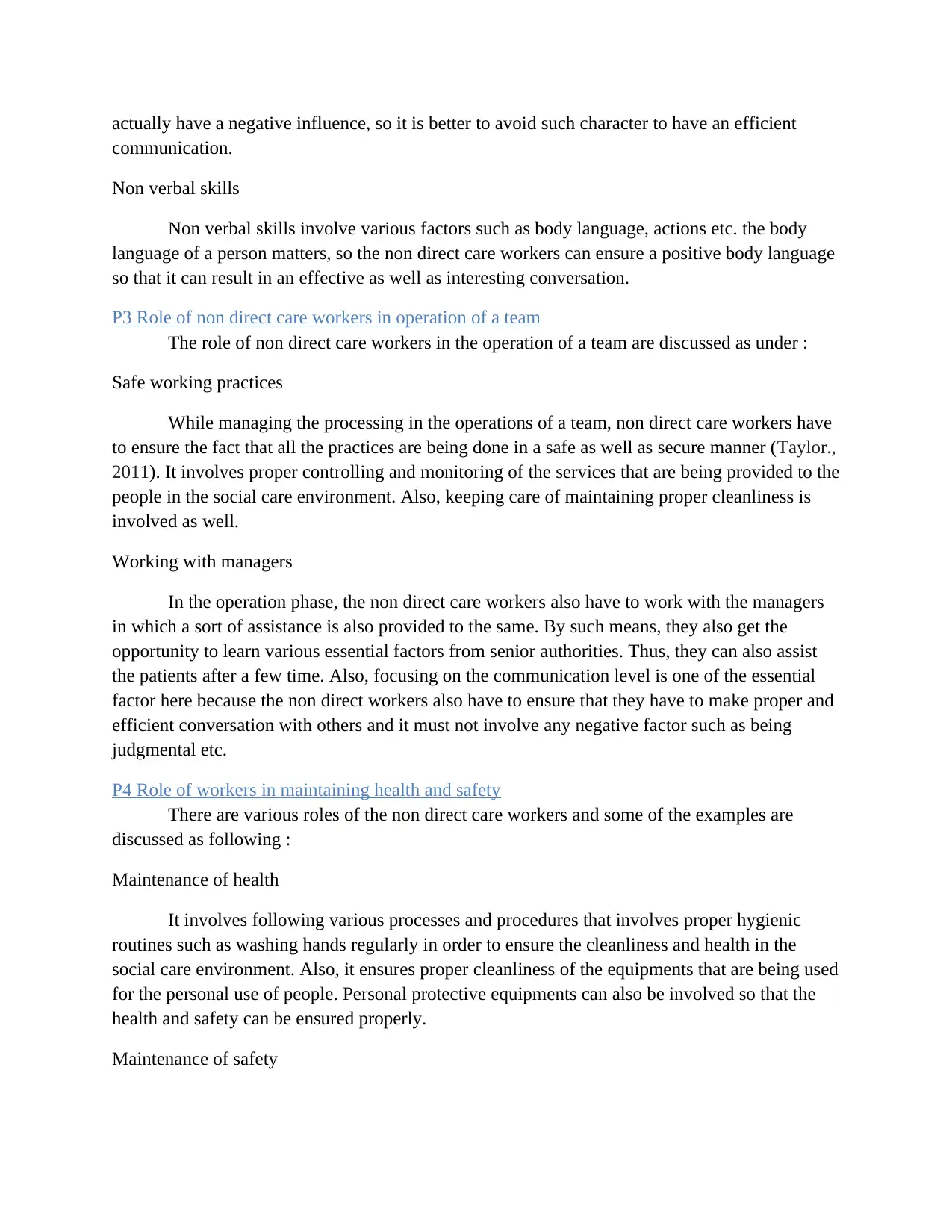
actually have a negative influence, so it is better to avoid such character to have an efficient
communication.
Non verbal skills
Non verbal skills involve various factors such as body language, actions etc. the body
language of a person matters, so the non direct care workers can ensure a positive body language
so that it can result in an effective as well as interesting conversation.
P3 Role of non direct care workers in operation of a team
The role of non direct care workers in the operation of a team are discussed as under :
Safe working practices
While managing the processing in the operations of a team, non direct care workers have
to ensure the fact that all the practices are being done in a safe as well as secure manner (Taylor.,
2011). It involves proper controlling and monitoring of the services that are being provided to the
people in the social care environment. Also, keeping care of maintaining proper cleanliness is
involved as well.
Working with managers
In the operation phase, the non direct care workers also have to work with the managers
in which a sort of assistance is also provided to the same. By such means, they also get the
opportunity to learn various essential factors from senior authorities. Thus, they can also assist
the patients after a few time. Also, focusing on the communication level is one of the essential
factor here because the non direct workers also have to ensure that they have to make proper and
efficient conversation with others and it must not involve any negative factor such as being
judgmental etc.
P4 Role of workers in maintaining health and safety
There are various roles of the non direct care workers and some of the examples are
discussed as following :
Maintenance of health
It involves following various processes and procedures that involves proper hygienic
routines such as washing hands regularly in order to ensure the cleanliness and health in the
social care environment. Also, it ensures proper cleanliness of the equipments that are being used
for the personal use of people. Personal protective equipments can also be involved so that the
health and safety can be ensured properly.
Maintenance of safety
communication.
Non verbal skills
Non verbal skills involve various factors such as body language, actions etc. the body
language of a person matters, so the non direct care workers can ensure a positive body language
so that it can result in an effective as well as interesting conversation.
P3 Role of non direct care workers in operation of a team
The role of non direct care workers in the operation of a team are discussed as under :
Safe working practices
While managing the processing in the operations of a team, non direct care workers have
to ensure the fact that all the practices are being done in a safe as well as secure manner (Taylor.,
2011). It involves proper controlling and monitoring of the services that are being provided to the
people in the social care environment. Also, keeping care of maintaining proper cleanliness is
involved as well.
Working with managers
In the operation phase, the non direct care workers also have to work with the managers
in which a sort of assistance is also provided to the same. By such means, they also get the
opportunity to learn various essential factors from senior authorities. Thus, they can also assist
the patients after a few time. Also, focusing on the communication level is one of the essential
factor here because the non direct workers also have to ensure that they have to make proper and
efficient conversation with others and it must not involve any negative factor such as being
judgmental etc.
P4 Role of workers in maintaining health and safety
There are various roles of the non direct care workers and some of the examples are
discussed as following :
Maintenance of health
It involves following various processes and procedures that involves proper hygienic
routines such as washing hands regularly in order to ensure the cleanliness and health in the
social care environment. Also, it ensures proper cleanliness of the equipments that are being used
for the personal use of people. Personal protective equipments can also be involved so that the
health and safety can be ensured properly.
Maintenance of safety
Paraphrase This Document
Need a fresh take? Get an instant paraphrase of this document with our AI Paraphraser
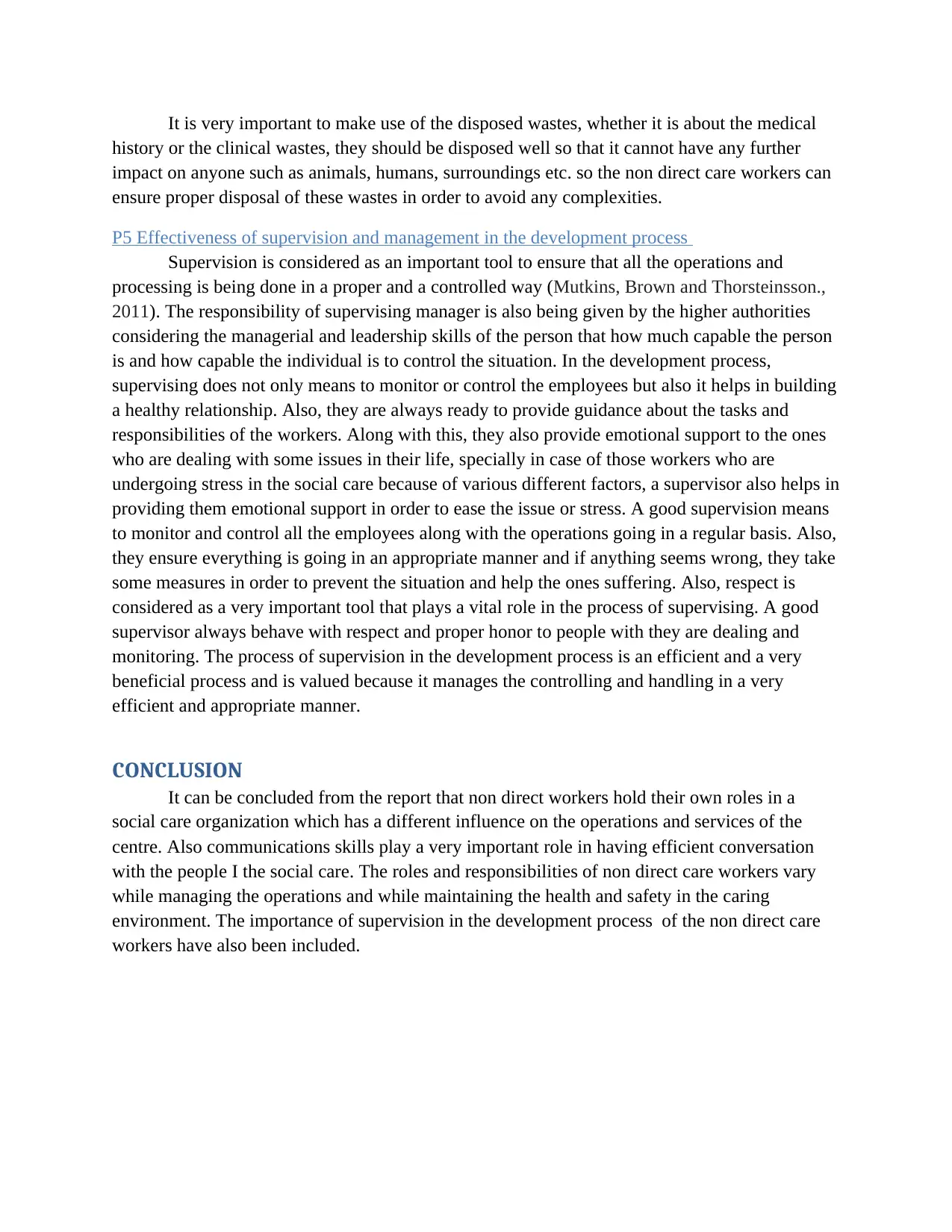
It is very important to make use of the disposed wastes, whether it is about the medical
history or the clinical wastes, they should be disposed well so that it cannot have any further
impact on anyone such as animals, humans, surroundings etc. so the non direct care workers can
ensure proper disposal of these wastes in order to avoid any complexities.
P5 Effectiveness of supervision and management in the development process
Supervision is considered as an important tool to ensure that all the operations and
processing is being done in a proper and a controlled way (Mutkins, Brown and Thorsteinsson.,
2011). The responsibility of supervising manager is also being given by the higher authorities
considering the managerial and leadership skills of the person that how much capable the person
is and how capable the individual is to control the situation. In the development process,
supervising does not only means to monitor or control the employees but also it helps in building
a healthy relationship. Also, they are always ready to provide guidance about the tasks and
responsibilities of the workers. Along with this, they also provide emotional support to the ones
who are dealing with some issues in their life, specially in case of those workers who are
undergoing stress in the social care because of various different factors, a supervisor also helps in
providing them emotional support in order to ease the issue or stress. A good supervision means
to monitor and control all the employees along with the operations going in a regular basis. Also,
they ensure everything is going in an appropriate manner and if anything seems wrong, they take
some measures in order to prevent the situation and help the ones suffering. Also, respect is
considered as a very important tool that plays a vital role in the process of supervising. A good
supervisor always behave with respect and proper honor to people with they are dealing and
monitoring. The process of supervision in the development process is an efficient and a very
beneficial process and is valued because it manages the controlling and handling in a very
efficient and appropriate manner.
CONCLUSION
It can be concluded from the report that non direct workers hold their own roles in a
social care organization which has a different influence on the operations and services of the
centre. Also communications skills play a very important role in having efficient conversation
with the people I the social care. The roles and responsibilities of non direct care workers vary
while managing the operations and while maintaining the health and safety in the caring
environment. The importance of supervision in the development process of the non direct care
workers have also been included.
history or the clinical wastes, they should be disposed well so that it cannot have any further
impact on anyone such as animals, humans, surroundings etc. so the non direct care workers can
ensure proper disposal of these wastes in order to avoid any complexities.
P5 Effectiveness of supervision and management in the development process
Supervision is considered as an important tool to ensure that all the operations and
processing is being done in a proper and a controlled way (Mutkins, Brown and Thorsteinsson.,
2011). The responsibility of supervising manager is also being given by the higher authorities
considering the managerial and leadership skills of the person that how much capable the person
is and how capable the individual is to control the situation. In the development process,
supervising does not only means to monitor or control the employees but also it helps in building
a healthy relationship. Also, they are always ready to provide guidance about the tasks and
responsibilities of the workers. Along with this, they also provide emotional support to the ones
who are dealing with some issues in their life, specially in case of those workers who are
undergoing stress in the social care because of various different factors, a supervisor also helps in
providing them emotional support in order to ease the issue or stress. A good supervision means
to monitor and control all the employees along with the operations going in a regular basis. Also,
they ensure everything is going in an appropriate manner and if anything seems wrong, they take
some measures in order to prevent the situation and help the ones suffering. Also, respect is
considered as a very important tool that plays a vital role in the process of supervising. A good
supervisor always behave with respect and proper honor to people with they are dealing and
monitoring. The process of supervision in the development process is an efficient and a very
beneficial process and is valued because it manages the controlling and handling in a very
efficient and appropriate manner.
CONCLUSION
It can be concluded from the report that non direct workers hold their own roles in a
social care organization which has a different influence on the operations and services of the
centre. Also communications skills play a very important role in having efficient conversation
with the people I the social care. The roles and responsibilities of non direct care workers vary
while managing the operations and while maintaining the health and safety in the caring
environment. The importance of supervision in the development process of the non direct care
workers have also been included.
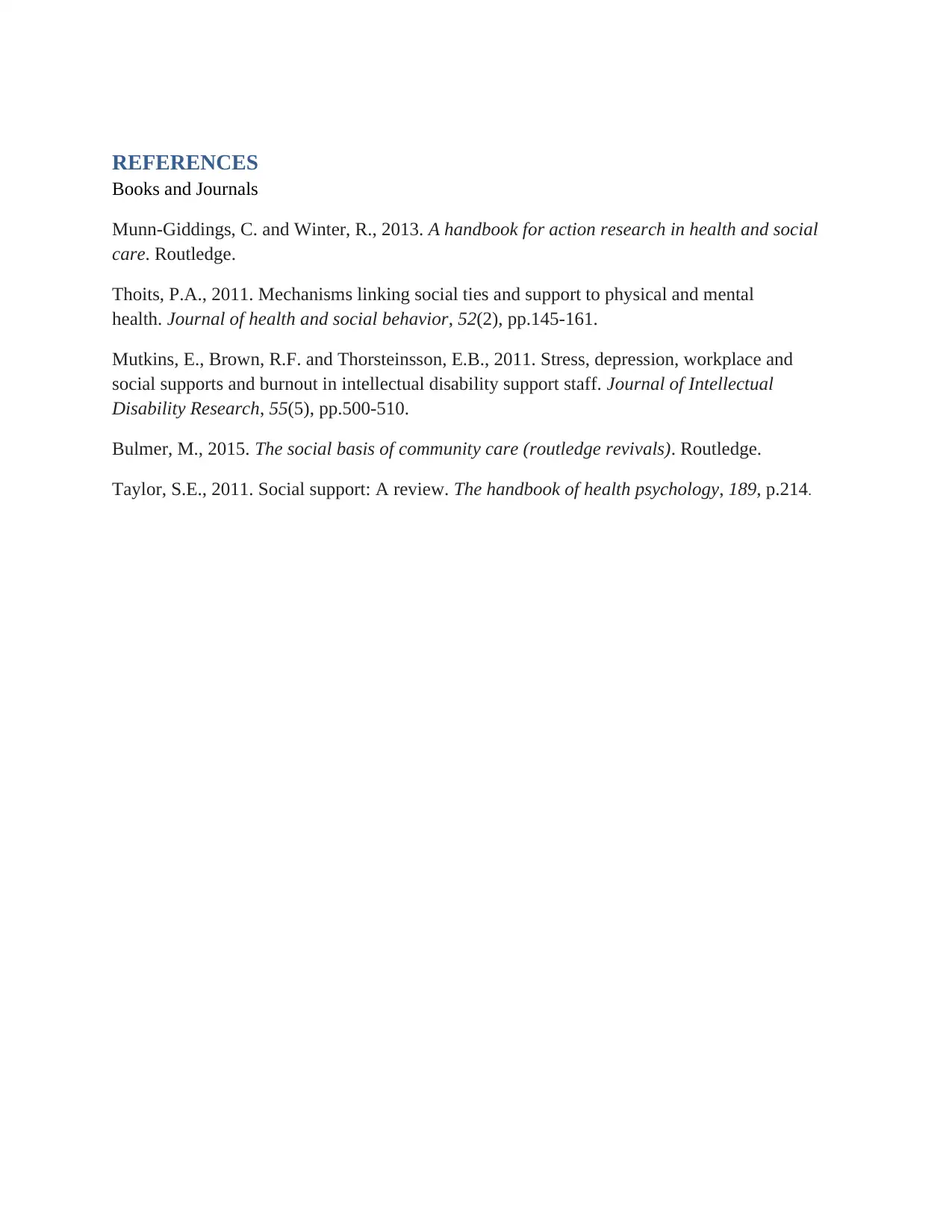
REFERENCES
Books and Journals
Munn-Giddings, C. and Winter, R., 2013. A handbook for action research in health and social
care. Routledge.
Thoits, P.A., 2011. Mechanisms linking social ties and support to physical and mental
health. Journal of health and social behavior, 52(2), pp.145-161.
Mutkins, E., Brown, R.F. and Thorsteinsson, E.B., 2011. Stress, depression, workplace and
social supports and burnout in intellectual disability support staff. Journal of Intellectual
Disability Research, 55(5), pp.500-510.
Bulmer, M., 2015. The social basis of community care (routledge revivals). Routledge.
Taylor, S.E., 2011. Social support: A review. The handbook of health psychology, 189, p.214.
Books and Journals
Munn-Giddings, C. and Winter, R., 2013. A handbook for action research in health and social
care. Routledge.
Thoits, P.A., 2011. Mechanisms linking social ties and support to physical and mental
health. Journal of health and social behavior, 52(2), pp.145-161.
Mutkins, E., Brown, R.F. and Thorsteinsson, E.B., 2011. Stress, depression, workplace and
social supports and burnout in intellectual disability support staff. Journal of Intellectual
Disability Research, 55(5), pp.500-510.
Bulmer, M., 2015. The social basis of community care (routledge revivals). Routledge.
Taylor, S.E., 2011. Social support: A review. The handbook of health psychology, 189, p.214.
⊘ This is a preview!⊘
Do you want full access?
Subscribe today to unlock all pages.

Trusted by 1+ million students worldwide
1 out of 6
Related Documents
Your All-in-One AI-Powered Toolkit for Academic Success.
+13062052269
info@desklib.com
Available 24*7 on WhatsApp / Email
![[object Object]](/_next/static/media/star-bottom.7253800d.svg)
Unlock your academic potential
Copyright © 2020–2026 A2Z Services. All Rights Reserved. Developed and managed by ZUCOL.





